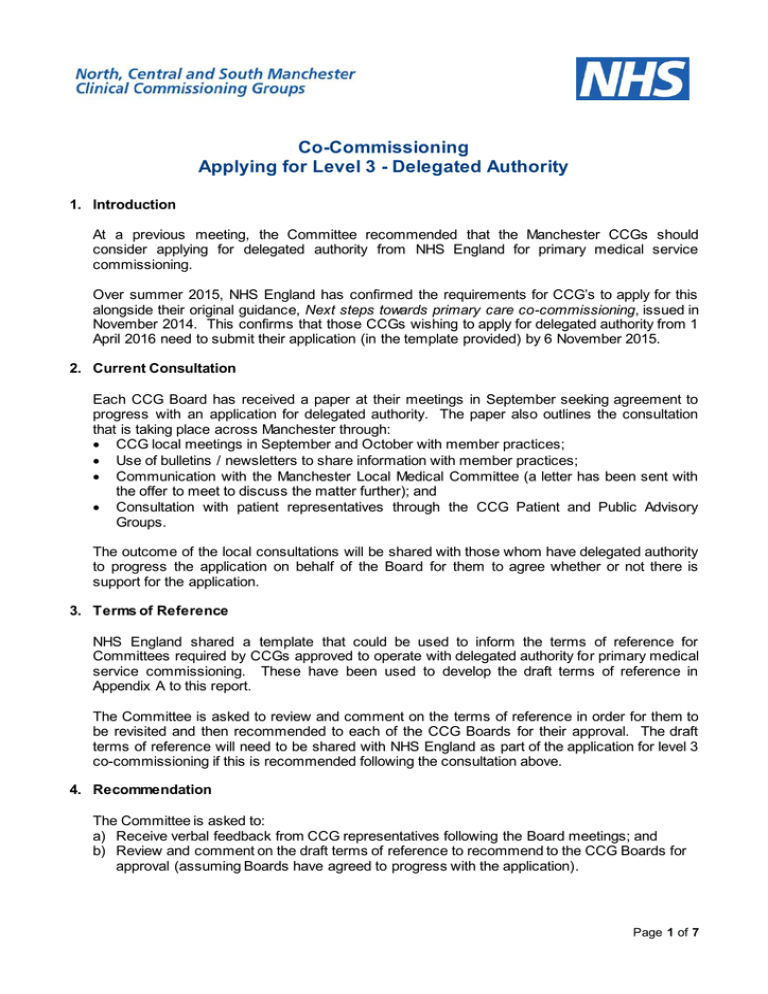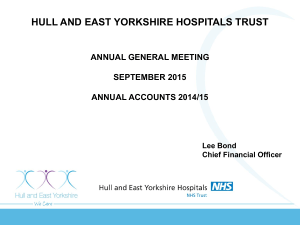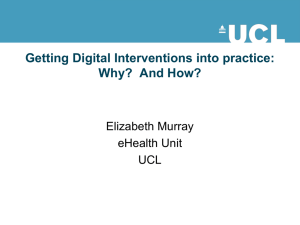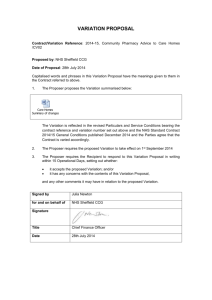Suggested Terms of Reference for delegated authority
advertisement

Co-Commissioning Applying for Level 3 - Delegated Authority 1. Introduction At a previous meeting, the Committee recommended that the Manchester CCGs should consider applying for delegated authority from NHS England for primary medical service commissioning. Over summer 2015, NHS England has confirmed the requirements for CCG’s to apply for this alongside their original guidance, Next steps towards primary care co-commissioning, issued in November 2014. This confirms that those CCGs wishing to apply for delegated authority from 1 April 2016 need to submit their application (in the template provided) by 6 November 2015. 2. Current Consultation Each CCG Board has received a paper at their meetings in September seeking agreement to progress with an application for delegated authority. The paper also outlines the consultation that is taking place across Manchester through: CCG local meetings in September and October with member practices; Use of bulletins / newsletters to share information with member practices; Communication with the Manchester Local Medical Committee (a letter has been sent with the offer to meet to discuss the matter further); and Consultation with patient representatives through the CCG Patient and Public Advisory Groups. The outcome of the local consultations will be shared with those whom have delegated authority to progress the application on behalf of the Board for them to agree whether or not there is support for the application. 3. Terms of Reference NHS England shared a template that could be used to inform the terms of reference for Committees required by CCGs approved to operate with delegated authority for primary medical service commissioning. These have been used to develop the draft terms of reference in Appendix A to this report. The Committee is asked to review and comment on the terms of reference in order for them to be revisited and then recommended to each of the CCG Boards for their approval. The draft terms of reference will need to be shared with NHS England as part of the application for level 3 co-commissioning if this is recommended following the consultation above. 4. Recommendation The Committee is asked to: a) Receive verbal feedback from CCG representatives following the Board meetings; and b) Review and comment on the draft terms of reference to recommend to the CCG Boards for approval (assuming Boards have agreed to progress with the application). Page 1 of 7 Appendix A CCG Primary Care Commissioning Committee Terms of Reference Key: Black text = national terms of reference template and Annex E of Next Steps Next steps towards primary care co-commissioning Red text = local insertion / suggestion Purple text = additional text within national template Introduction 1. Simon Stevens, the Chief Executive of NHS England, announced on 1 May 2014 that NHS England was inviting CCGs to expand their role in primary care commissioning and to submit expressions of interest setting out the CCG’s preference for how it would like to exercise expanded primary medical care commissioning functions. One option available was that NHS England would delegate the exercise of certain specified primary care commissioning functions to a CCG. 2. In accordance with its statutory powers under section 13Z of the National Health Service Act 2006 (as amended), NHS England has delegated the exercise of the functions specified in Schedule 2 to these Terms of Reference to XX Manchester CCG. The delegation is set out in Schedule 1. 3. The CCG has established the XX Manchester CCG Primary Care Commissioning Committee (“Committee”). The Committee will function as a corporate decision-making body for the management of the delegated functions and the exercise of the delegated powers. 4. It is a committee comprising representatives of the following organisations: XX Manchester CCG NHS England; Public Health Manchester; Patient and Public Advisory Group. Statutory Framework 5. NHS England has delegated to the CCG authority to exercise the primary care commissioning functions set out in Schedule 2 in accordance with section 13Z of the NHS Act. 6. Arrangements made under section 13Z may be on such terms and conditions (including terms as to payment) as may be agreed between the Board and the CCG. 7. Arrangements made under section 13Z do not affect the liability of NHS England for the exercise of any of its functions. However, the CCG acknowledges that in exercising its functions (including those delegated to it), it must comply with the statutory duties set out in Chapter A2 of the NHS Act and including: a) Management of conflicts of interest (section 14O); b) Duty to promote the NHS Constitution (section 14P); c) Duty to exercise its functions effectively, efficiently and economically (section 14Q); d) Duty as to improvement in quality of services (section 14R); e) Duty in relation to quality of primary medical services (section 14S); f) Duties as to reducing inequalities (section 14T); g) Duty to promote the involvement of each patient (section 14U); h) Duty as to patient choice (section 14V); Page 2 of 7 8. i) Duty as to promoting integration (section 14Z1); j) Public involvement and consultation (section 14Z2). The CCG will also need to specifically, in respect of the delegated functions from NHS England, exercise those set out below: 9. Duty to have regard to impact on services in certain areas (section 13O); Duty as respects variation in provision of health services (section 13P). The Committee is established as a committee of the XX Manchester CCG Governing Body in accordance with Schedule 1A of the “NHS Act”. 10. The members acknowledge that the Committee is subject to any directions made by NHS England or by the Secretary of State. Role of the Committee 11. The Committee has been established in accordance with the above statutory provisions to enable the members to make collective decisions on the review, planning and procurement of primary care services in XX Manchester, under delegated authority from NHS England. 12. In performing its role the Committee will exercise its management of the functions in accordance with the agreement entered into between NHS England and XX Manchester CCG, which will sit alongside the delegation and terms of reference. 13. The functions of the Committee are undertaken in the context of a desire to promote increased co-commissioning to increase quality, efficiency, productivity and value for money and to remove administrative barriers. 14. The role of the Committee shall be to carry out the functions relating to the commissioning of primary medical services under section 83 of the NHS Act. 15. This includes the following: GMS, PMS and APMS contracts (including the design of PMS and APMS contracts, monitoring of contracts, taking contractual action such as issuing branch/remedial notices, and removing a contract); Newly designed enhanced services (“Local Enhanced Services” and “Directed Enhanced Services”); Design of local incentive schemes as an alternative to the Quality Outcomes Framework (QOF); Decision making on whether to establish new GP practices in an area; Approving practice mergers; and Making decisions on ‘discretionary’ payment (e.g., returner/retainer schemes). 16. The CCG will also carry out the following activities: Plan, including needs assessment, primary medical care services in XX Manchester; Undertake reviews of primary medical care services in XX Manchester; Co-ordinate a common approach to the commissioning of primary care services generally; Manage the budget for commissioning of primary medical care services in XX Manchester. Geographical Coverage 17. The Committee’s responsibilities will cover the same geographical areas as those of will comprise the XX Manchester CCG, as defined in the CCG’s Constitution. Membership 18. The Committee shall consist of: Governing body lay member with PPI responsibility Page 3 of 7 Governing body lay member Chief Operating Officer Chief Finance Officer Director of Public Health (non-voting) Health and Well Being Board representative (non-voting) Healthwatch / PPAG representative (non-voting) GP Board member NHS England representative (non-voting) 19. The Chair of the Committee shall be the governing body lay member with PPI responsibility. 20. The Vice Chair of the Committee shall be the governing body lay member. 21. Other people may be invited to the meeting either routinely or on an ad hoc basis but these will not have any voting rights. Meetings and Voting 22. The Committee will operate in accordance with the CCG’s Constitution (including the Standing Orders and Scheme of Reservation and Delegation). The XX Secretary [amend as relevant to individual CCG arrangements] to the Committee will be responsible for giving notice of meetings. This will be accompanied by an agenda and supporting papers and sent to each member representative no later than seven calendar days before the date of the meeting. When the Chair of the Committee deems it necessary in light of the urgent circumstances to call a meeting at short notice, the notice period shall be such as the Chair s/he shall specify. 23. Each member of the Committee shall have one vote. Members may nominate deputies to attend on their behalf and this will be formally minuted. Such deputies shall have the same right as the named member in terms of voting or not. The Committee shall reach decisions by a simple majority of members present, but with the Chair having a second and deciding vote, if necessary. However, the aim of the Committee will be to achieve consensus decision-making wherever possible. Quorum 24. The Committee shall be quorate when two thirds of the members are present including the Chair or Deputy Chair and either the Chief Operating Officer or the Chief Finance Officer. Frequency of meetings 25. The Committee shall meet monthly until such time as it determines that meetings of less frequency are required. [The suggested frequency is weekly for the first month and then as agreed after that]. 26. Meetings of the Committee shall: a) be held in public, subject to the application of 23(b); b) the Committee may resolve to exclude the public from a meeting that is open to the public (whether during the whole or part of the proceedings) whenever publicity would be prejudicial to the public interest by reason of the confidential nature of the business to be transacted or for other special reasons stated in the resolution and arising from the nature of that business or of the proceedings or for any other reason permitted by the Public Bodies (Admission to Meetings) Act 1960 as amended or succeeded from time to time. 27. Members of the Committee have a collective responsibility for the operation of the Committee. They will participate in discussion, review evidence and provide objective expert input to the best of their knowledge and ability, and endeavour to reach a collective view. 28. The Committee may delegate tasks to such individuals, sub-committees or individual members as it shall see fit, provided that any such delegations are consistent with the parties’ relevant governance arrangements, are recorded in a scheme of delegation, are governed by terms of Page 4 of 7 reference as appropriate and reflect appropriate arrangements for the management of conflicts of interest. 29. The Committee may call additional experts to attend meetings on an ad hoc basis to inform discussions. 30. Members of the Committee shall respect confidentiality requirements as set out in the CCG’s Constitution. 31. The Committee will present its minutes to the Lancashire and Greater Manchester Sub Team of NHS England and the governing body of XX Manchester CCG each month (or as it meets, e.g. if meetings are bi-monthly) for information, including information regarding the minutes of any of the Committee’s sub-committees to which responsibilities are delegated under paragraph 27 above. 32. The CCG will also comply with any reporting requirements set out in its constitution. 33. These terms of reference will be reviewed at least annually, reflecting the experience of the Committee in fulfilling its functions. NHS England may also issue revised model terms of reference from time to time. Accountability of the Committee 34. [Budget and resource accountability arrangements and the decision-making scope of the Committee to be included within this section as agreed] [The CCG will need to review its Standing Financial Instructions and Standing Orders to ensure that are sufficient in the context of delegated commissioning.] [For the avoidance of doubt, in the event of any conflict between the terms of this Scheme of Delegation and Terms of Reference and the Standing Orders of Standing Financial Instructions of any of the members, the latter will prevail.] 35. The Committee will ensure that there is appropriate consultation with patients and the public to inform any considerations the Committee makes. This will be conducted primarily through the CCG’s Patient and Public Advisory Group (a member of whom will sit on the Committee). Procurement of Agreed Services 36. [The detailed arrangements regarding procurement will be set out in the delegation agreement. Please refer to the Next Steps in primary care co-commissioning document for further guidance on this.] Decisions 37. The Committee will make decisions within the bounds of its remit. 38. The decisions of the Committee shall be binding on NHS England and XX Manchester CCG. 39. The Committee will produce an executive summary report which will be presented to the Lancashire and Greater Manchester Sub Team of NHS England and the governing body of XX Manchester CCG Board of the CCG each month [could be longer period] for information. Signed: ………………………………………………….. On behalf of the CCG ………………………………………………….. On behalf of Lancashire and Greater Manchester Sub Team of NHS England Agreed: [insert date agreed by CCG Board/NHS E – whichever is the latest] Review date: [insert date six months after first meeting] Page 5 of 7 Schedule 1 – Delegated Functions In accordance with its statutory powers under section 13Z of the National Health Service Act 2006 (as amended) (“NHS Act”), NHS England has delegated the exercise of the functions specified in this Delegation to XX Manchester CCG to empower XX Manchester CCG to commission primary medical services for the people of XX Manchester. NHS England and the CCG have entered into the Delegation Agreement that sets out the detailed arrangements for how the CCG will exercise its delegated authority. Even though the exercise of the functions passes to the CCG the liability for the exercise of any of its functions remains with NHS England. In exercising its functions (including those delegated to it) the CCG must comply with the statutory duties set out in the NHS Act and/or any directions made by NHS England or by the Secretary of State, and must enable and assist NHS England to meet its corresponding duties. The following are the delegated functions for the CCG Primary Care Commissioning Committee regarding Primary Medical Services are: a) decisions in relation to the commissioning, procurement and management of Primary Medical Services Contracts, including but not limited to the following activities: i) decisions in relation to Enhanced Services; ii) decisions in relation to Local Incentive Schemes (including the design of such schemes); iii) decisions in relation to the establishment of new GP practices (including branch surgeries) and closure of GP practices; iv) decisions about ‘discretionary’ payments; v) decisions about commissioning urgent care (including home visits as required) for out of area registered patients; b) the approval of practice mergers; c) planning primary medical care services in XX Manchester the Area, including carrying out needs assessments; d) undertaking reviews of primary medical care services in XX Manchester the Area; e) decisions in relation to the management of poorly performing GP practices and including, without limitation, decisions and liaison with the CQC where the CQC has reported non-compliance with standards (but excluding any decisions in relation to the performers list); f) management of the Delegated Funds in XX Manchester the Area; g) Premises Costs Directions functions; h) co-ordinating a common approach to the commissioning of primary care services with other commissioners in XX Manchester the Area where appropriate; and i) such other ancillary activities as are necessary in order to exercise the Delegated Functions. Page 6 of 7 Schedule 2- Reserved Functions NHS England will exercise its functions relating to primary medical services other than the Delegated Functions set out in Schedule 1. NHS England will retain responsibility for: a) management of the national performers list; b) management of the revalidation and appraisal process; c) administration of payments in circumstances where a performer is suspended and related performers list management activities; d) Capital Expenditure functions; e) section 7A functions under the NHS Act; f) functions in relation to complaints management; g) decisions in relation to the Prime Minister’s Challenge Fund; and h) such other ancillary activities that are necessary in order to exercise the Reserved Functions; Schedule 3 – List of Members To be inserted once these are agreed Page 7 of 7




